“It was the best of times, it was the worst of times, it was the age of wisdom, it was the age of foolishness, it was the epoch of belief, it was the epoch of incredulity, it was the season of Light, it was the season of Darkness, it was the spring of hope, it was the winter of despair, we had everything before us, we had nothing before us, we were all going direct to Heaven, we were all going direct the other way – in short, the period was so far like the present period, that some of its noisiest authorities insisted on its being received, for good or for evil, in the superlative degree of comparison only.” Charles Dickens, A Tale of Two Cities
On June 16, 1858 at the Republican State Convention in Springfield, Illinois Abraham Lincoln gave a speech in which he used the biblical quote “a house divided against itself cannot stand.” American today is once again a house divided. Whether we can remain standing depends on how deep the divisions are and how long they last.
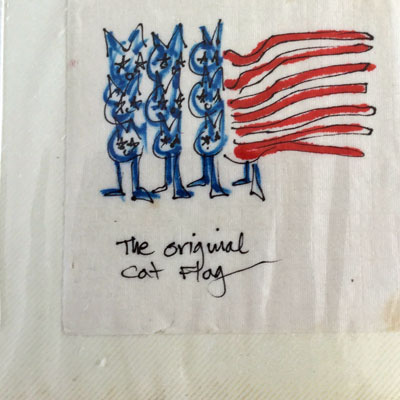
Sea Gull Cellar Bar Napkin Art, Kelly House Collection, James Maxwell Artist
My concern is that the divisions are deep and likely to be long lasting.
In the 1950s, C.P. Snow wrote of The Two Cultures. He was referring to science and the humanities and the lack of communication between the two. While that lack of communication remains, the two cultures are slowly coming together as seen in a series of interviews in Seed Magazine available online HERE.

Sea Gull Cellar Bar, Napkin Art, Jack Haye artist
The divide between intellectuals of the 1950s is child’s play compared to the serious rifts in society we see today. The pillorying of the 1% is only one indication of our problems.
The divisions today are not squabbles between intellectuals. Conservative libertarian thinker and writer Charles Murray in Coming Apart a few years ago and in his new book By The People: Rebuilding Liberty Without Permission, says the key division in America today is between elitists and the working middle class. He’s right. (See this INTERVIEW)
You don’t have to accept Murray’s analysis (I don’t) to see that what he speaks about is real. The success of Bernie Sanders and Donald Trump is proof enough of that. I first wrote about this in an earlier blog HERE.
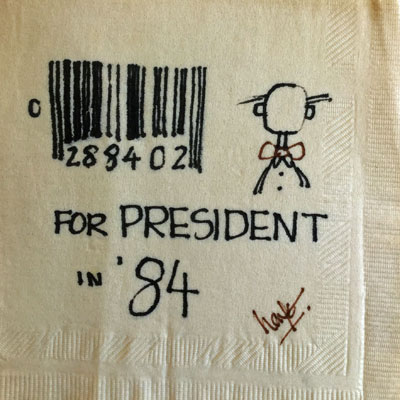
Sea Gull Cellar Bar Napkin Art, Jack Haye artist
Since writing that piece, Hillary Clinton edged out Bernie Sanders, but Donald Trump secured the Republican Presidential nomination contrary to the predictions of many embarrassed pundits. And, he is running strong against the Democratic nominee.
Regardless of your feelings about Donald Trump, his appeal is based on real issues that are not going away soon. Charles Murray frames his conclusions in the usual libertarian rhetoric, but that does not mean they aren’t true:
“There are all sorts of ways in which the things I discuss in By the People – an overweening government, experts who say ‘we know better’, who will tell you how you ought to live your life, and so on – have an enormous day-to-day impact on people’s lives. If we assume that Hillary Clinton is going to win, which I think is quite likely, everything that she says about what she wants to do indicates that all of these problems are going to get worse – in terms of regulation, in terms of interfering in people’s lives. I think By the People is going to become more important three or four years from now, just as Coming Apart has become more relevant over time.”
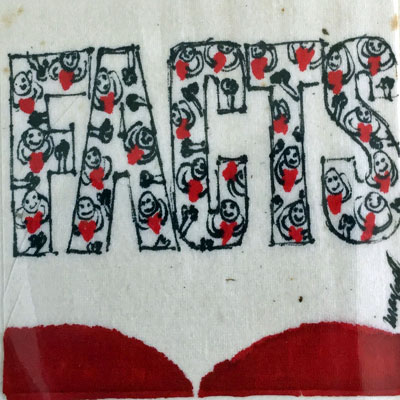
Sea Gull Cellar Bar Napkin Art, Kelly House Collection, James Maxwell artist
The problems for middle aged white Americans (the group Murray focuses on) include out-of-wedlock births, drug abuse, marginal employment, shorter lifespans and rising rates of suicide, all problems that used to be associated with people of color. See THIS SUMMARY of a study by Angus Deaton who won the Nobel Prize in economics last year for the bleak details.
But, that is not the only divide in our society today. Social Security and Medicare are underfunded. This sets up an obvious tension between the elderly, who expect these benefits, and the young who must pay for them. Reasonable fixes have been proposed but the political will to implement them has been lacking.
The government debt is another issue where older Americans and younger Americans are likely to be on different sides. The cost to carry this debt will increase substantially if interest rates rise as they almost surely will. This burden will fall mostly on the backs of those who already feel disenfranchised.
America, the great melting pot, is threatening to clamp on a tight lid.
“Give me your tired, your poor,
Your huddled masses yearning to breathe free,
The wretched refuse of your teeming shore.
Send these, the homeless, tempest-tossed to me.
I lift my lamp beside the golden door.”
The middle class is rightly concerned about their economic wellbeing. They look to their leaders for solutions. Trump’s simple slogans calling for economic nationalism, nativism and opposition to all things politically correct, cutting the flow of immigrants and undoing trade deals has widespread appeal when no other clear solutions are proposed. They sound like quick and easy solutions. The problem is these policies will do nothing to increase economic growth. They assume a zero-sum society where you lose if someone else wins.
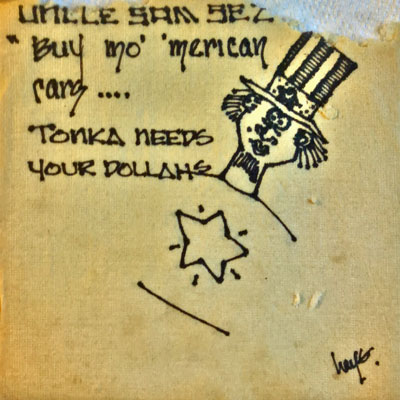
Sea Gull Cellar Bar Napkin Art, Jack Haye artist
However, if the benefits of economic growth accrue to a small group (the 1%) and not to the population as a whole, then the zero-sum model becomes real for those outside the favored few. Without a sense of fairness, even the best economic system will break down. And that’s what we seem to have at this point, a breakdown.
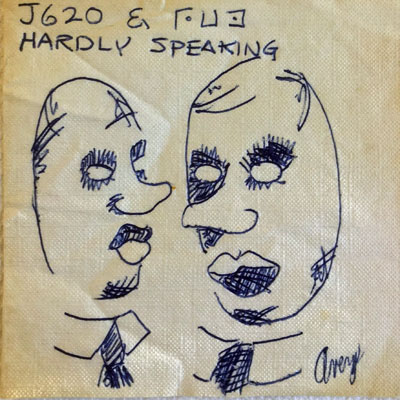
Sea Gull Cellar Bar Napkin Art, Bob Avery artist
Once a society succumbs to economic nationalism, nativism, and opposition to all things politically correct, the dark side takes over. The elites and intellectuals who abused their positions are understandably no longer trusted. Even when they have good ideas, those ideas are ignored. Stagnation follows. Everyone loses.
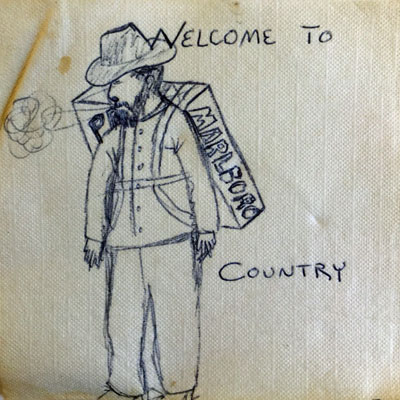
Sea Gull Cellar Bar Napkin Art, artist unknown
It doesn’t have to be this way. In fact, it has been just the opposite for most of our history. The elites have done a reasonable job, the benefits have been divided in reasonably fair and acceptable ways. But, from time to time the train goes off the tracks. After a secular decline from 1930 to 1980, inequality has been increasing and is now at the highest levels since the 1920s. We are heading for a train wreck unless we find a way to close the divide.
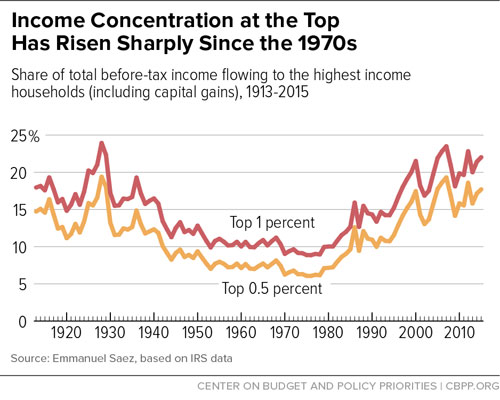


Great stuff, King David.